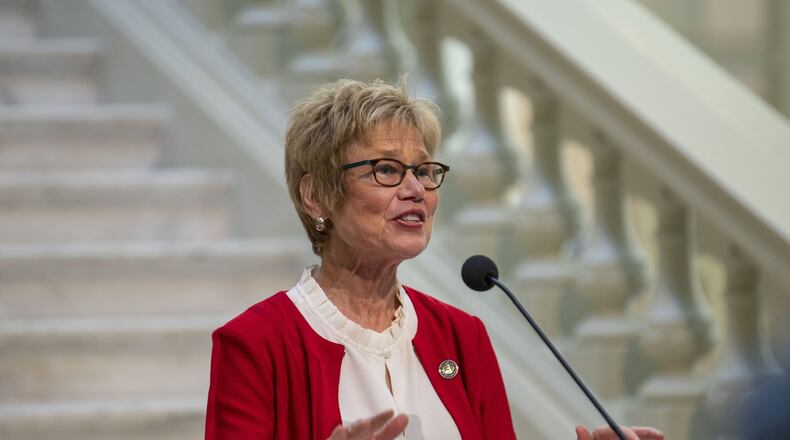Concerned that widespread protests could be new hot spots for the coronavirus, the state’s top health official said Tuesday she plans to set up test sites for demonstrators to screen for cases of the disease.
Dr. Kathleen Toomey, the commissioner of the Georgia Department of Public Health (DPH), said her agency is also working with Atlanta Mayor Keisha Lance Bottoms’ office and other state agencies to test first-responders and National Guard members who may have been exposed. Toomey said pop-up COVID-19 testing sites could be deployed as soon as next week.
“We want to ensure that the pandemic doesn’t spread because of this,” Toomey said at a press conference with Gov. Brian Kemp. Toomey, who was the only speaker who wore a mask at the press conference, said demonstrations present the risk of continued spread of the virus just as with any mass gathering situation in which people are in close quarters.
» NEW DASHBOARD: The AJC's redesigned page of real-time charts tracking the virus
In response to vandalism Friday night in downtown Atlanta and Buckhead, Kemp activated the National Guard. Guard members and state officers also have been deployed to other Georgia cities to assist local authorities.
“I encourage all law enforcement along with those who are participating in the demonstrations to get tested immediately,” Kemp said.
Kemp said there might be a temporary decline in the number of COVID-19 tests administered statewide because of the National Guard’s shift from manning testing sites to providing security for the protests.
“These men and women in uniform will return to fulfill their original mission when the streets are safe,” the governor said.
Coronavirus reporting
On Tuesday, DPH unveiled a redesigned coronavirus data portal and reporting schedule the agency said should help improve accuracy.
The revamped website and once-daily reporting of coronavirus cases follow a series of reporting blunders that put the state in an unflattering national media spotlight.
In one, a chart of the Top 5 hardest hit counties showed sharp declines in cases, but the chart had dates not in chronological order.
The state also took heat for lumping together the number of diagnostic tests for the virus, which detect current infections, and serologic tests, which can indicate past infections.
Combining the figures for active and past infections inflated the number of total tests in the state, making it look as if Georgia’s testing figures were better than they were.
The new website will update total tests, confirmed cases and deaths once a day at 3 p.m., instead of three times daily.
The new reporting schedule, Kemp said, will allow DPH officials more time to accurately process and publish data.
DPH will now separate the number of diagnostic tests and serologic tests into separate columns. The site also includes rates of positive diagnostic and serologic tests, although multiple tests tied to one individual, as is sometimes the case, could skew those rates.
The website also has added more data about cases among age groups.
Ben Lopman, an Emory University professor of epidemiology, said COVID-19 cases and deaths have essentially plateaued in Georgia at an elevated rate. The state continues to risk new outbreaks as more businesses reopen and social interactions increase, he said.
The current seven-day rolling average of newly confirmed cases remains higher than when Kemp issued his shelter in place order in early April, Lopman said.
In late April, Kemp allowed barber shops, salons, tattoo parlors, nail shops, restaurants, bowling alleys and movie theaters reopen with new hygiene rules and capacity limits. The state’s shelter in place order ended at the end of April for all but the medically fragile and people over 65, who Kemp has ordered to remain at home until June 12.
A new executive order went into effect Monday allowing gatherings of up to 25 people with social distancing and bars and nightclubs to reopen with dozens of new stipulations.
At the press conference, Kemp cited positive signs, including increased bed capacity, fewer hospitalizations and a lower rate of positive tests.
Dr. Harry J. Heiman, a clinical associate professor at the Georgia State University School of Public Health, said shelter-in-place curbed spread, but Georgia hasn’t defeated the virus.
“What we’ve seen is a lack of a sustained decline and a plateau at a level higher than we’d have expected to see if we’d maintained shelter-in-place and social distancing for a longer level of time,” he said. “As long as you have a high level of community spread like we do, it’s challenging to enact a containment strategy.”
Confirmed deaths: 2,102
Keep Reading
The Latest
Featured







